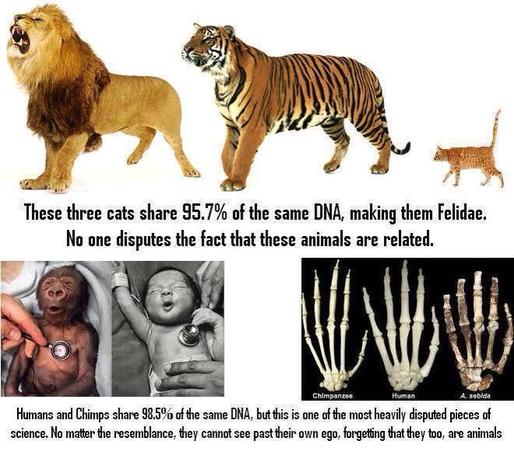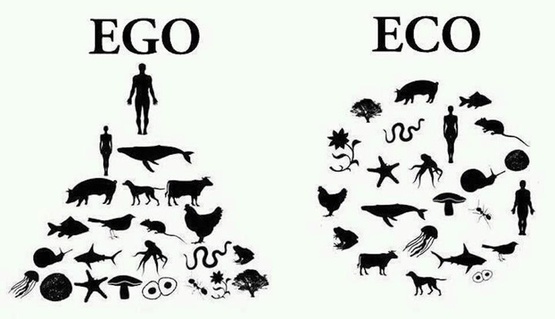The Origin of Humanity
"In speaking of the origin of man we generally have reference to the creation of man’s body; and, of all the mistakes that man has made concerning himself, one of the greatest and the gravest is that of mistaking the body for the man. The body is no more truly the whole man than is the coat the body.The man, as an individual intelligence, existed before his earthly body was framed and shall exist after that body has suffered dissolution."
- Elder James E. Talmage, in "The Earth and Man"
"Right down to the present day we have been the spectators of a foolish contest between equally vain and bigoted rivals, in which it is a moot question which side heaps the most contempt on God's creatures. For the fundamentalist, to associate man too closely with God's other creatures was the supreme insult to God and man. Man, say the Christian theologians, faithfully following Aristotle, is the rational animal; the only rational animal. All other beings in nature are soulless, speechless, thoughtless automata... The evolutionists took the doctors at their word and had a very easy time showing that man shares so many visible qualities and traits with other animals that if animals are mere 'things' then so is man." - Hugh Nibley, Latter-day Saint scholar
"The more experience and insight I obtain into human nature, the more convinced do I become that the greater portion of a man is purely animal."
- Henry Morton Stanley, journalist and explorer
- Elder James E. Talmage, in "The Earth and Man"
"Right down to the present day we have been the spectators of a foolish contest between equally vain and bigoted rivals, in which it is a moot question which side heaps the most contempt on God's creatures. For the fundamentalist, to associate man too closely with God's other creatures was the supreme insult to God and man. Man, say the Christian theologians, faithfully following Aristotle, is the rational animal; the only rational animal. All other beings in nature are soulless, speechless, thoughtless automata... The evolutionists took the doctors at their word and had a very easy time showing that man shares so many visible qualities and traits with other animals that if animals are mere 'things' then so is man." - Hugh Nibley, Latter-day Saint scholar
"The more experience and insight I obtain into human nature, the more convinced do I become that the greater portion of a man is purely animal."
- Henry Morton Stanley, journalist and explorer
I demonstrated in a previous section that human evolution is no more against LDS doctrine than evolution in general, yet it remains the biggest stumbling block for creationists in and out of the church. Humans are supposed to be distinct from all other animals, set apart by God. Even more critically, perhaps, creationists don't think any laws of morality can have any claim on us if we're descended from "lower" creatures. Some Saints avoid that dilemma by deciding that maybe other species evolved but ours was created separately - but that simply doesn't work because there is zero evidence that human origins had a separate and distinct process from any other life-forms, and a great deal of evidence to the contrary. For example, the "perfectly designed" human body includes several design flaws that any first-year engineering student could have avoided. These make sense in light of evolution, which can only modify pre-existing structures and hence seldom reaches the ideal solution. For example:
*Human eyeballs have nerves and blood vessels between the photosensitive cells and their light source, which is like a camera with film in front of the lens. (Remember "film"? It's this stuff that used to be inside of cameras and it would - ah, forget it. Trust me, this makes sense.) This makes our vision significantly weaker than it otherwise could be. And we have a blind spot right where this wiring goes through the retina toward the brain.
*Human spines are not designed for the stress of a bipedal gait. When our ancestors started walking on two legs, evolution couldn't just redesign their backbones (and wouldn't want to anyway because it doesn't "make decisions"). This causes us back pain in old age and sometimes even before then.
*Compounding that problem, our feet are poorly constructed to take the full force of walking and running.
*The immune system frequently attacks things that it isn't supposed to. This causes allergies, which are so commonplace that no one bats an eyelash at them. In fairness this one could also be caused by entropy through the ages and/or the world we develop in.
*We have five enzymes required to produce Vitamin C internally, but one of them is defective, making us one of the few animals in the world that can't do it. But we share this predicament with apes and monkeys, due to the exact same mutation - and with guinea pigs and fruit bats, due to entirely different mutations. It's almost as if we're more closely related to apes and monkeys.
*Wisdom teeth. Enough said. Interestingly enough, because these are no longer an advantage and are sometimes detrimental to health, the human race is now evolving to no longer have them. Even though the incidence of humans dying of infected wisdom teeth before they get a chance to reproduce is very low, the slight reproductive advantage it gives to individuals without wisdom teeth is enough to have a significant cumulative effect over multiple generations.
*Goosebumps, when we're scared, are supposed to make us look bigger and more intimidating - but since we're no longer covered with fur, they just make us look stupid.
*The recurrent laryngeal nerve is seven times longer than necessary because it takes a pointless detour down from the brain, around the heart, and back up to the larynx. This is the case in all mammals and amounts to fifteen extra feet in giraffes.
*The appendix has an annoying inclination toward getting infected, rupturing, and killing people.
*Some parts of our genome (though less than previously thought), known as "junk DNA", are redundant or incomplete and don't appear to actually code for anything.
*The same tube that we use for breathing is also used for eating and drinking, which obviously creates an unnecessary choking risk.
*The male urinary tract runs through the prostate for no functional reason, meaning that abnormal prostate growth can obstruct the flow of urine, which is a rather unpleasant thing to have happen.
*Human testicles are unwieldy and vulnerable. (As my biology professor Dr. Frank Messina put it: "Guys, when you get hit between the legs you don't say 'What a perfect design!' You might say a few other things, but we won't go into that.")
*Women don't have wide enough pelvises for childbirth. Not only does this result in excruciating pain, but without adequate medical care they can develop obstetric fistula, which is a fancy way of saying they get stretched so much it tears extra holes in them.
*The proximity of sexual organs to waste removal is unsanitary.
*Love makes us stupid and our hearts get broken too easily. No, but seriously, humans are born about three months prematurely because otherwise we wouldn't fit through the birth canal, which means that we're completely dependent on others to do every single little thing for us, which means our lives literally depend on them loving us enough to do so, which means our brains associate love with survival, which means love is linked to the hypothalamus (responsible for the "fight or flight" response), which means that not only does love override the cortex and rational thought, but losing it literally causes the body to respond as if its survival is threatened. Thanks, evolution, and by "thanks" I mean "up yours".
Besides the flaws there are also little quirks, like human fetuses temporarily having fur, tails, and empty yolk sacs despite drawing nourishment from their mothers. Or the way our hair stands up on end when we get scared - if we were covered in fur like most mammals, it would make us look larger and more intimidating; since we aren't, we just look ridiculous. These are obviously vestiges of our evolutionary past. (Such things are, of course, also present in other animals. Blind moles and cave fish have eyes, flightless birds have wings, legless whales have hip bones, some snake species have the remains of a pelvis, and chickens still have the genes for teeth which are simply "switched off" and not expressed.) Then there are several things having to do with sex, including some that you wouldn't think had anything to do with sex. All of them are explained by ancestral behavior and reproductive needs.
Evolution also explains a lot about the human condition. The flaws listed above are basically universal, but most would count themselves fortunate to have only those ones. When people are born with Downs syndrome, missing limbs, blindness or deafness, or any of a few thousand other things that can and do go wrong, we (and hopefully they) accept it as part of the trials they were called to bear in this mortal existence. Yet I've never met anyone who believed that God Himself manually designed their bodies with those shortcomings built in. We accept such things, though they are His will, as the result of genetic and environmental factors.
*Human eyeballs have nerves and blood vessels between the photosensitive cells and their light source, which is like a camera with film in front of the lens. (Remember "film"? It's this stuff that used to be inside of cameras and it would - ah, forget it. Trust me, this makes sense.) This makes our vision significantly weaker than it otherwise could be. And we have a blind spot right where this wiring goes through the retina toward the brain.
*Human spines are not designed for the stress of a bipedal gait. When our ancestors started walking on two legs, evolution couldn't just redesign their backbones (and wouldn't want to anyway because it doesn't "make decisions"). This causes us back pain in old age and sometimes even before then.
*Compounding that problem, our feet are poorly constructed to take the full force of walking and running.
*The immune system frequently attacks things that it isn't supposed to. This causes allergies, which are so commonplace that no one bats an eyelash at them. In fairness this one could also be caused by entropy through the ages and/or the world we develop in.
*We have five enzymes required to produce Vitamin C internally, but one of them is defective, making us one of the few animals in the world that can't do it. But we share this predicament with apes and monkeys, due to the exact same mutation - and with guinea pigs and fruit bats, due to entirely different mutations. It's almost as if we're more closely related to apes and monkeys.
*Wisdom teeth. Enough said. Interestingly enough, because these are no longer an advantage and are sometimes detrimental to health, the human race is now evolving to no longer have them. Even though the incidence of humans dying of infected wisdom teeth before they get a chance to reproduce is very low, the slight reproductive advantage it gives to individuals without wisdom teeth is enough to have a significant cumulative effect over multiple generations.
*Goosebumps, when we're scared, are supposed to make us look bigger and more intimidating - but since we're no longer covered with fur, they just make us look stupid.
*The recurrent laryngeal nerve is seven times longer than necessary because it takes a pointless detour down from the brain, around the heart, and back up to the larynx. This is the case in all mammals and amounts to fifteen extra feet in giraffes.
*The appendix has an annoying inclination toward getting infected, rupturing, and killing people.
*Some parts of our genome (though less than previously thought), known as "junk DNA", are redundant or incomplete and don't appear to actually code for anything.
*The same tube that we use for breathing is also used for eating and drinking, which obviously creates an unnecessary choking risk.
*The male urinary tract runs through the prostate for no functional reason, meaning that abnormal prostate growth can obstruct the flow of urine, which is a rather unpleasant thing to have happen.
*Human testicles are unwieldy and vulnerable. (As my biology professor Dr. Frank Messina put it: "Guys, when you get hit between the legs you don't say 'What a perfect design!' You might say a few other things, but we won't go into that.")
*Women don't have wide enough pelvises for childbirth. Not only does this result in excruciating pain, but without adequate medical care they can develop obstetric fistula, which is a fancy way of saying they get stretched so much it tears extra holes in them.
*The proximity of sexual organs to waste removal is unsanitary.
*Love makes us stupid and our hearts get broken too easily. No, but seriously, humans are born about three months prematurely because otherwise we wouldn't fit through the birth canal, which means that we're completely dependent on others to do every single little thing for us, which means our lives literally depend on them loving us enough to do so, which means our brains associate love with survival, which means love is linked to the hypothalamus (responsible for the "fight or flight" response), which means that not only does love override the cortex and rational thought, but losing it literally causes the body to respond as if its survival is threatened. Thanks, evolution, and by "thanks" I mean "up yours".
Besides the flaws there are also little quirks, like human fetuses temporarily having fur, tails, and empty yolk sacs despite drawing nourishment from their mothers. Or the way our hair stands up on end when we get scared - if we were covered in fur like most mammals, it would make us look larger and more intimidating; since we aren't, we just look ridiculous. These are obviously vestiges of our evolutionary past. (Such things are, of course, also present in other animals. Blind moles and cave fish have eyes, flightless birds have wings, legless whales have hip bones, some snake species have the remains of a pelvis, and chickens still have the genes for teeth which are simply "switched off" and not expressed.) Then there are several things having to do with sex, including some that you wouldn't think had anything to do with sex. All of them are explained by ancestral behavior and reproductive needs.
Evolution also explains a lot about the human condition. The flaws listed above are basically universal, but most would count themselves fortunate to have only those ones. When people are born with Downs syndrome, missing limbs, blindness or deafness, or any of a few thousand other things that can and do go wrong, we (and hopefully they) accept it as part of the trials they were called to bear in this mortal existence. Yet I've never met anyone who believed that God Himself manually designed their bodies with those shortcomings built in. We accept such things, though they are His will, as the result of genetic and environmental factors.
The Natural Man and Human Morality
"The natural man is an enemy to God," declared the prophet Alma in the Book of Mormon. And where does the natural man come from, if not nature? The same concept outlined above with birth defects applies to more universal "natural man" traits as lust, anger, greed, and self-centeredness. The natural man is essentially an animal that wants to survive and reproduce at all costs. These traits served our evolutionary ancestors well, as they serve other animals, but now we as a species have come to a point where we're held to a higher standard. We, unlike other animals, don't need the natural man for survival and are actually better off not indulging it. Why would God personally program each human brain with these traits and then tell us not to act on them?
The misconception that evolution precludes human morality is probably the biggest reason why creationists are willing to make fools of themselves fighting against it. If we evolved from lower animals, they ask, then what separates us from them? How can anything we do be considered sinful or immoral? As the evangelical band ApologetiX puts it in "The Real Sin Savior", "My mama was a fish! My mama was a fish! And if we're monkeys you might as well forget original sin!" This is obviously a straw man, and Latter-day Saints don't believe in original sin, but its general point arguably remains.
The misconception that evolution precludes human morality is probably the biggest reason why creationists are willing to make fools of themselves fighting against it. If we evolved from lower animals, they ask, then what separates us from them? How can anything we do be considered sinful or immoral? As the evangelical band ApologetiX puts it in "The Real Sin Savior", "My mama was a fish! My mama was a fish! And if we're monkeys you might as well forget original sin!" This is obviously a straw man, and Latter-day Saints don't believe in original sin, but its general point arguably remains.
Plenty of idiots do indeed claim that morality is relative, but it isn't evolution per se that pushes this attitude so much as their rejection of God. If God didn't exist, then however we got here wouldn't matter as far as morality is concerned. But since God does exist, however we got here doesn't matter as far as morality is concerned. Science can't explain morality and it probably never will. And that's okay. That's not part of its jurisdiction. It can show us some tangible benefits of moral behavior, and I do believe that the intelligence our species evolved to possess is a major factor. Young children, mentally handicapped people, and the rest of the animal kingdom are not and cannot be held accountable to moral laws that they lack the mental capacity to understand.
But these laws didn't become binding on Adam and Eve until after they became like God and gained a knowledge of good and evil. Before that they were "innocent" and not held accountable. Continuing Alma's statement, he said that the natural man "has been [an enemy of God] from the fall of Adam". The key difference here is not just intelligence but the spirits we possess, which are literally spirit children of God. This separates us from all other animals including, so far as we know, our evolutionary ancestors. We also have the Light of Christ, which helps many people figure out right and wrong even if they're improperly taught. Again, these are theological matters that science can tell us nothing about one way or another, but they certainly aren't in conflict with evolution.
Even the theory that religion developed among human ancestors, and has vestiges in modern apes, shouldn't be an issue. All non-human forms of life on the Earth, and even the Earth itself, obey God perfectly (which is why humans are described at length in Mosiah 4 as "less than the dust of the earth"). So I think it stands to reason that the more intelligent an animal is, the closer it gets to actually understanding that there is a higher power out there, especially since "all things denote there is a God" (Alma 30:44). Even though pre-homo sapiens hominids probably aren't part of the same Plan of Salvation as us and don't need to be cleansed from sin, they were very intelligent and it makes perfect sense to me that they would recognize and praise God, even if they don't have nearly as much understanding of Him. The hymn "All Creatures of Our God and King" was written for a reason.
Next: Criticisms of Evolution
But these laws didn't become binding on Adam and Eve until after they became like God and gained a knowledge of good and evil. Before that they were "innocent" and not held accountable. Continuing Alma's statement, he said that the natural man "has been [an enemy of God] from the fall of Adam". The key difference here is not just intelligence but the spirits we possess, which are literally spirit children of God. This separates us from all other animals including, so far as we know, our evolutionary ancestors. We also have the Light of Christ, which helps many people figure out right and wrong even if they're improperly taught. Again, these are theological matters that science can tell us nothing about one way or another, but they certainly aren't in conflict with evolution.
Even the theory that religion developed among human ancestors, and has vestiges in modern apes, shouldn't be an issue. All non-human forms of life on the Earth, and even the Earth itself, obey God perfectly (which is why humans are described at length in Mosiah 4 as "less than the dust of the earth"). So I think it stands to reason that the more intelligent an animal is, the closer it gets to actually understanding that there is a higher power out there, especially since "all things denote there is a God" (Alma 30:44). Even though pre-homo sapiens hominids probably aren't part of the same Plan of Salvation as us and don't need to be cleansed from sin, they were very intelligent and it makes perfect sense to me that they would recognize and praise God, even if they don't have nearly as much understanding of Him. The hymn "All Creatures of Our God and King" was written for a reason.
Next: Criticisms of Evolution




